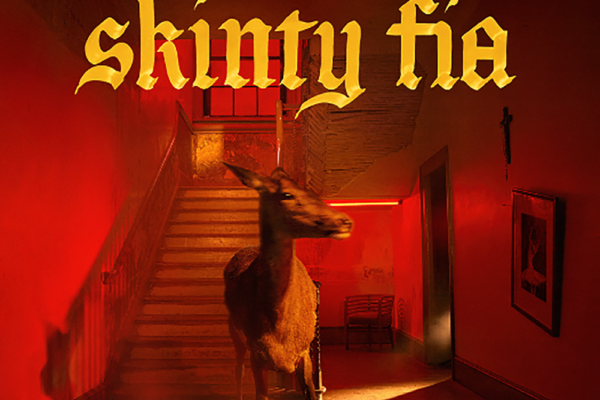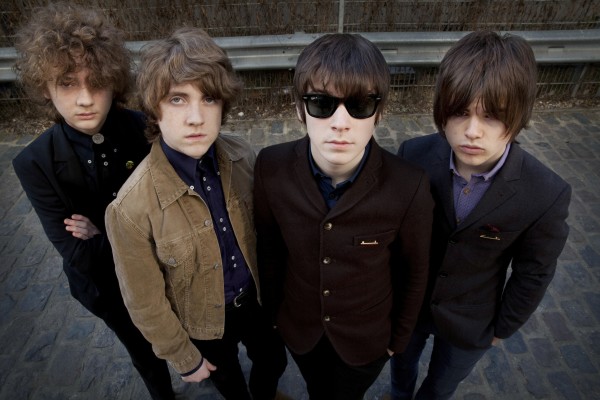The process of discovering new artists is mostly a mystery: someone heard someone somewhere, this band opened for that band, the reclusive artist’s song was used in a wan VW commercial. Blake Mills, I discovered not because of any magazine article or word on the street, but because my guitar amp was broken. YouTube videos of repairs led to watching people demoing vintage amps that I can’t afford, which led to rig rundowns, which led to the St. Vincent episode of Guitar Moves. She was episode 8. Eventually I got back to his, the second episode.
Such are the paths that we take sometimes; within hours I was infatuated with this artist I had never even heard of. I was dismayed to find out that he had only the one album from four years ago, 2010’s Break Mirrors. It was the work of amateurs (he was 24 when it came out), but the songwriting quality was there. His songs had a relatability to them (which I dig no matter what Margaret Mead thinks), lines like “Just copy paste google search and send it to myself” came out of nowhere. And for someone so open, he went to great lengths to burrow his identity: the man on the cover of the album is not him, and I suspect that Break Mirrors is English for Blake Mills, or alternately a subtle hint to a disinterestedness in being relatable, or both.
Fortunately, Mills’ second album wasn’t too far away from when I first discovered him, and he picks up right where he left off on his follow-up Heigh Ho. The lead single “Don’t Tell Our Friends About Me,” is the mantra of a man that wants to be in control of his own image. You can read it as the tail-side of the Break Mirrors single, “Hey Lover”. Both take on love’s ends and beginnings in the grand tradition of power pop. “Hey Lover’s” “I want to raise with you, and watch our younglings hatch” is replaced by “lover’s may quarrel and spar sometimes.”
Heigh Ho mostly remains on this course for the rest of the album. It is in the great vain of inspired flame songs, and each seems to be about a different stage in a break-up. He sings “I write songs that help me deal with issues” at some point before the break-up, but the opening track “If I’m Unworthy”, sees Mills “wrapped in the sheets” asking his former lover to “look what your love can do.”
It’s fairly obvious that these songs are directed at his former flame, Danielle Haim, known mostly for her sister-band’s break-out single “The Wire.” (Which, depending on which sister was responsible for the lyrics, may be about Mills). Most notably, in the last song, “Curable Disease” he talks about the girl chasing her dreams and becoming a household name, a pursuit he doesn’t understand. “Your dreams are not mine.”
While Mill’s lyrics are certainly worthy of discussion (especially keeping in mind that Jackson Browne got a credit somewhere along the way for co-writing, and he wrote “These Days” when he was 16), Mills deserves credit for songwriting and musicianship, in some places haunting and others dreamy. He is a student of the school of Elliott Smith, who wrote empathetically, and avoided conventions (as his “Whatever (Some Folk Song In C)” specifically derides). A thorough listen to Heigh Ho shows a songwriter who knows the folk tradition, knows the singer-songwriter tradition, blues and rock & roll, and flips them all on their head to find new ground.
“Cry To Laugh,” his take on “Corrina, Corrina,” is a good example of this. The guitar starts out naturally, but gets derailed somewhere after the first phrase into some mood that is somewhere between “Dark Eyes” and something off Love & Theft until he finally resolves the tension with the chorus. All beautifully weighed down by a walking bass line that keeps something of a swing going, knowing it takes a lot to laugh, but a train to cry.
The album continues with “Just Out of View,” which serves to display further idiosyncrasies in these sonic experiments (catch that nearly silent finger snap that lands in the middle of the bridge). It’s a fluid piece that at times feels more like a movement in a larger piece than a standalone track.
“Seven” has Mills and sometimes collaborator Fiona Apple doing their best Gram Parsons/Emmylou Harris impression in a standard country rock number until the whirly bells and pianos turn it into a circus. Throwing on a slide guitar outro (one of Mill’s go-tos) further undermines what could have been a simple, but trite country ballad. (And if I had my guess, the song that makes him cry is probably “Love Hurts” off of Parson’s posthumous Grievous Angel.)
“Gold Coast Sinking” is mostly straight-forward California-rock, which says almost nothing about the song; on first listen it was my least favorite, but after repeated spins, it’s grown on me. But I definitely wish that Joe Walsh riff weren’t in there. After this track, the album takes a softer turn into what is probably side B of the vinyl. “Three Weeks in Havana” has him turn in a Cubano inspired tune, relating perhaps to the trip he took there with producer/bassist Don Was.
“Half Asleep”, “Before It Fell”, and near-masterpiece “Cureable Disease” sound like modern covers of Brill Building songs. (Mills has been known to break out a stellar cover of “Save the Last Dance For Me). But of note are the background instrumentals by yMusic, Don Was, Jon Brion and others across the album, which especially compliment these three tracks: The strings on “Half Asleep” are simply astounding, the Cubano part of “Before It Fell” jubilant, and “Cureable Disease” is sonically perfect.
“Silence is Sincerity” and “Shed Your Head,” the two instrumental tracks on Heigh Ho, couldn’t be any more different. The former is loose, light, and short; the latter taut, heavy, and long. While both are aurally pleasing, it’s hard to find a value in “Shed Your Head” as part of the greater whole, whereas “Silence Is Sincerity” bisects the album at a convenient space. At nearly 8 minutes long, it takes up the space that other songs might have, that might have served the flow of the album better. It’s “Strangers”-esque drum outro is nearly a minute alone.
Mills is still a guitar player first and foremost. While he may wear other hats at times, it is here that he truly excels. And each song is worthy of a chapter on the beauty and novelty of his guitar playing, but it is back to “Don’t Tell Our Friends About Me” that deserves the most attention. The main riff that sounds familiar and obscure at the same time, something he certainly pulls off better than most of his contemporaries.
But mostly it’s the double tracked solo at the end of the song. They roughly start out at the same point, double tracked to give it weight. But after a quarter of the solo they start to diverge, both taking a different road, and by halfway they are clashing. It doesn’t take a musicologist to figure out what he’s doing here, no special education. The characters in the song are fighting, so are the guitar tracks.
This is exactly what makes Heigh Ho and Blake Mill’s songwriting, playing, and producing so good. At the face of it, it sounds so complex and difficult, but all he’s doing is looking at things from a different angle, finding out easy ways to sound difficult. The result is one of the year’s best albums, and an artist worth watching.
I guess I’m glad my amp was broke.
Article by: Christopher Gilson
Photo credit: Mike Piscitelli




